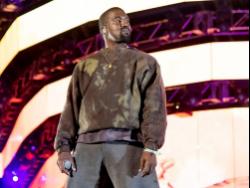
It has been said in the music business that he who owns the master is the master, and this is true on a global level. The Twitter rants and antics by American producer, rapper, fashion designer and presidential candidate wannabe, Kanye West, has placed this issue of ownership squarely on the table. Kanye is currently on a mega trip to own his masters, and while this isn’t new, he has turned up his tirades to the next level, comparing the industry to a slave ship and even using shock tactics by placing his Grammy award in the toilet and urinating on it on a video posted to Twitter.
“I need to see everybody’s contracts at Universal and Sony [record companies]. I’m not gonna watch my people be enslaved. I’m putting my life on the line for my people. The music industry and the NBA are modern day slave ships. I’m the new Moses,” the controversial West tweeted. He added in another, “There is no NBA or music industry without black people … fair contracts matter … ownership matters.”
WHAT IS A MASTER?
West, who calls himself a “creative genius” signed a deal with EMI, which is owned by Sony/ATV. The contract grants EMI control over his masters, and he is feeling much like the action that got him a temporary ban from Twitter. But what exactly is a master, and how does this play out in the Jamaican scenario, where music is churned out on rapid? Prolific record producer, Gussie Clarke, explained to The Gleaner that the master is simply the physical, original, recording of a performance from which copies can be made. These recordings can be on a tape, a Pro Tools file, or MP3 and the owner has control over how these recordings are used, and how money is earned from them. According to the veteran producer, however, what obtains outside of Jamaica is not the same situation which plays out in the island.
“Overseas, for example, the record company puts up the money for the total production and after recovering all of their investment, they can enter into discussion with the artistes about ownership of the masters. But all of this is fully worked out beforehand in a contract between the parties involved,” Clarke, one of the founding members of the Jamaica Association of Composers, Authors and Publishers, (JACAP) related. In most of the standard major label contracts, ownership of the master is granted to the record label..
Clarke pointed out that such ownership is not as simple in the Jamaican context, which is quite informal and involves one party taking the risks associated with the project. “In Jamaica, it’s a bit different. First of all, artistes usually have no financial input in the recording. A producer will see an artiste and say, ‘mi have a riddim, come put a tune on it fi mi’. The costs are then undertaken by the executive producer and the producer, without any monetary investment from the artiste, who is paid to record the song,” Clarke said. So if the project flops, it is the producer who has to hug up the losses.
He noted that the producer/executive producer therefore has full ownership of the recording, which is different from the copyright. “As the owner of the master, he can basically do whatever he wants with it. And this includes selling the master to a potential buyer, whoever that may be,” he said.
Clarke also mentioned another side to the risk-taking which has affected several producers. “There are artistes who are signed to a foreign record label and then they go and do a song for a producer. The producers pays the artiste and spends money to put out the tune, only for the record company to say ‘hold on, we have signed that artiste exclusively, so you can’t release any music for him’,” the Gussie Clarke Music Group CEO shared.
In the case of Kanye West, who has not been shy in stating his desire to own the rights to his music, the American rapper in one of his rants said that the record company was refusing to sell, because they knew he was rich enough to afford it.